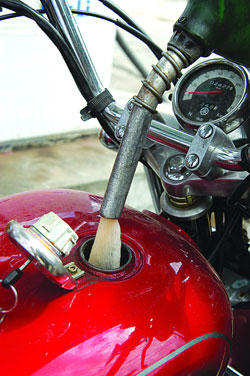|
|
Much adulterated fuel has been dispensed through the fuel pumps since this weekly broke the story of corruption at the oil corporation five years ago ('Nepal Oil Corruption', #19). The Beed has kept prodding this issue ('Oil yo-yo' in #139, 'Mixing oil and money' in #185, and 'Fuel for fear' in #262). The media is focusing entirely on how the poor will suffer from a price hike and the vandalism that followed the sudden increment. But there's more to this particular price hike.
First, oil like vegetables or fruits is a commodity in the market. Global prices are swayed by demand and supply and geo-politics. For Nepal our fixed currency exchange rate with India means our prices fluctuate with the Indian market, and prices are hardly ever declining. (See page 6,7). By selling oil here at lower prices than in India, we are giving our business people an opportunity to bring in vacant tankers into Nepal while the precious oil is already emptied in India. This has opened up the jerkin economy where people load fuel products into jerry cans and peddle them across the border. The primary objective should be price parity both in Nepal and India rather than the cost of product or taxation.
Second, an oil price hike is seen as a political issue and not an economic one. How can we believe that a government unable to stand by a decision on a simple oil price hike to handle critical issues like arms management, monetary policy and fiscal discipline? The government itself has given petrol mafias the freedom to hoard and this raises doubts about the intentions of those in government and in the corporation.
Third, oil dealers are the least trusted. The consumer believes and prefers the government run gas stations. This is because dealers make money by hoarding supplies and adulterating fuel rather than providing good customer service. Further, the entire business works like a cartel, defeating the whole concept of market, consumer choice and pricing. We need to open up the sector to global companies who believe in serving the consumer.
Finally, the government monolith has to be disbanded. While some of the losses of NOC (No Oil Corporation) are actually due to taxes levied on the petroleum products, it is an institution that constantly survives on the taxpayers' money and loans. The government needs to disclose all the properties pledged to NOC to keep the company afloat. NOC under a management contract can remain custodian of the storage facilities and leave everything to credible private players.
It's terrible to lose millions of dollars a day because the government cannot take charge of law and order. Consumers need to be told why a price hike is necessary, and be assured of a perennial supply, quality and service.




